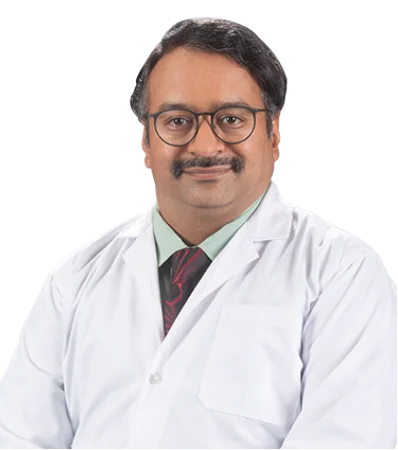Sinus Surgery
Restoring Health and Comfort with Precision Sinus Care
Sinus surgery refers to a special procedure designed to treat chronic sinusitis as well as other sinus-related issues which do not respond to treatment. Sinus problems that are chronic can greatly affect your quality of life and cause symptoms like chronic nose congestion, facial pain as well as frequent and severe infections. In Chirayu Super Speciality Hospital, our skilled team offers the latest procedures for sinus surgery, employing modern techniques that provide effective relief and improve nasal function.

What is Sinus Surgery?
Sinus surgery is a surgical procedure to address problems within the sinus cavity. The procedure is intended to increase drainage, and decrease inflammation of the sinuses thus reducing signs of chronic sinusitis as well as other sinus-related conditions. The most commonly used techniques are Functional Endoscopic Sinus Surgery (FESS) balloon sinuplasty and removal of sinus cysts. The aim is to improve sinus function, decrease the incidence of infections, and improve the overall nasal breathing.
Who Performs Your Surgery?
Sinus operations performed at Chirayu Super Speciality Hospital are performed by highly experienced Otolaryngologists (ENT specialists) who have extensive experience managing complicated sinus conditions. Our doctors utilize the most recent technology and techniques to provide accurate and efficient results. Our surgical staff is aided by highly skilled anesthesiologists as well as nursing personnel, who provide comprehensive support before, during and after the procedure, to ensure a comfortable and safe experience.
Types of Sinus Surgery
- Functional Endoscopic Sinus Surgery (FESS) : A minimally invasive procedure that uses an endoscope to observe and treat sinus problems. FESS is efficient in removal of polyps, repairing blockages in the anatomy, and improving sinus drainage.
- Balloon Sinuplasty : A procedure which involves inserting a balloon inside the sinus, and then balloon inflation to expand the sinus passageways, to improve drainage and avoiding the necessity for surgery.
- Sinus Cyst Removal : Performed to remove cysts or growths in the sinuses, which can block normal function and trigger symptoms.
- Sinusotomy : An operation to open a hole within the sinus cavity in order to allow more drainage and lessen inflammation.
Symptoms Indicating the Need for Sinus Surgery
- Nasal congestion that is chronic and is not relieved by medication.
- Pressure or facial pain that persists
- Consistent sinus infections and sinusitis that persist even after treatment.
- A diminished sense of smell or taste.
- Chronic cough and post nasal drip.
- Sinus-related pain and headaches.
Diagnosis for Sinus Surgery
The diagnosis is made after a thorough examination of the symptoms and medical background. An ENT expert will carry out a physical exam which could include nasal endoscopy to see the sinus passages. Imaging tests like CT scans and MRIs are frequently utilized to determine the severity of sinus problems and to guide the procedure. The aim is to determine the root cause of sinus problem and decide on the most suitable surgical approach.
Treatment Process
The process of treatment begins by having a comprehensive consultation with the doctor to discuss the patient’s symptoms as well as treatment options and the anticipated outcomes. The procedure is generally performed under general anesthesia and the technique chosen is employed to address particular sinus problems identified. The post-operative treatment includes reducing discomfort, following the guidelines for treating the nasal area as well as attending follow-up visits in order to monitor healing and confirm the efficacy of the procedure. Patients might feel some discomfort at first, however, most will be able to return to routine activities within a couple of weeks.
Care and Recovery After Surgery
The recovery process following sinus surgery is comprised of many important aspects. The patients are directed to stay off and avoid vigorous activities for a certain period following surgery. Nasal care guidelines like using saline sprays and not blowing your nose, are offered to assist in the healing process. Treatment for pain and possibly antibiotics are prescribed to avoid infections and ease discomfort. Visits to follow-up are necessary to monitor the progress of recovery and to address any concerns. The majority of patients experience relief from sinus-related symptoms as well as better nasal function following recovery.
Advantages of Choosing Our Surgery Services
ENT Specialists
Our team of highly skilled ENT surgeons has extensive experience in performing advanced sinus surgeries, ensuring precise and effective treatment for complex sinus issues.
Advanced Technology
Our hospital is equipped with the latest surgical technology and imaging tools, enabling accurate diagnosis and effective treatment of sinus conditions with optimal results.
Personalized Treatment Plans
Each patient receives a tailored treatment plan based on their specific symptoms, medical history, and individual needs, ensuring the best possible outcomes for their sinus health.
What Our Patients Say
Read about our patients positive experiences and how Chirayu Super Speciality Hospital has positively impacted their health and well-being.


Thanks to Chirayu sinus surgery, I can breathe easier and enjoy life without the constant discomfort of sinus problems.


Chirayu sinus surgery was precise and effective. I no longer suffer from constant sinus infections and can breathe easily.


The care and expertise at Chirayu were exceptional. My sinus surgery was a success, and my symptoms have greatly improved.


Sinus surgery at Chirayu was life-changing. I finally have relief from chronic sinus pain and can breathe easily again.
Meet Our Medical Specialists
Our team of ENT specialists offers expert care for sinus surgery, providing precise treatments for chronic sinus issues with exceptional results.
Frequently Asked Questions
Here, we provide answers to some of the most commonly asked questions to help you better understand about our surgery services. If you have any additional questions, please do not hesitate to contact us.
Recovery involves managing pain, following nasal care instructions, and avoiding strenuous activities. Most patients experience noticeable relief within a few weeks.
Common reasons include chronic sinusitis, nasal polyps, blocked sinus passages, and recurrent sinus infections that do not respond to other treatments.
Risks include bleeding, infection, and changes in nasal sensation. Our experienced team takes measures to minimize these risks and ensure a successful outcome.
The duration of sinus surgery varies depending on the complexity of the procedure, but it generally lasts between 1 to 2 hours.
Most patients can return to light activities within a few days and resume normal activities within 1-2 weeks, depending on individual recovery.



